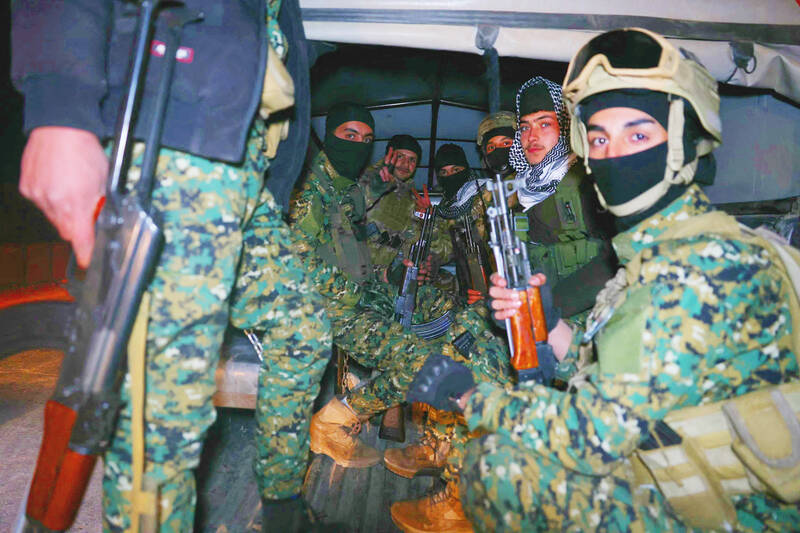Syria’s new authorities launched a sweeping security operation yesterday after clashes with fighters loyal to former president Bashar al-Assad killed 71 people, a war monitor reported.
The violence poses the biggest challenge to the country’s authorities since al-Assad was ousted in December last year, in a lightning offensive by Islamist-led rebels.
Restoring security has been one of the most complex tasks for the new authorities since al-Assad’s fall, which ended 13 years of civil war triggered by his crackdown on pro-democracy protests.

Photo: AFP
A curfew was enforced in the coastal province of Latakia, the al-Assad clan’s stronghold and home to a sizeable Alawite community, the same religious minority as the former president.
Security forces began what official news agency SANA described as a “large-scale” operation in cities, towns and the mountains of Latakia and neighbouring Tartus, following the arrival of reinforcements.
The operation “targeted remnants of Assad’s militias and those who supported them,” a security official cited by SANA said, as he called on civilians to “stay in their homes.”
The Syrian Ministry of Defense said it had sent reinforcements to the cities of Latakia and Tartus.
The clashes killed 71 people over the past day, among them 35 members of the security forces, 32 gunmen and four civilians, the Syrian Observatory for Human Rights’ said.
The Observatory, a Britain-based monitor, also reported dozens of people wounded and others taken prisoner by both sides.
The authorities have also imposed curfews in cities of Homs and Tartus.
Mustafa Kneifati, a security official in Latakia, said that in “a well-planned and premeditated attack, several groups of Assad militia remnants attacked our positions and checkpoints, targeting many of our patrols in the Jableh area.”
Kneifati said security forces would “work to eliminate their presence.”
“We will restore stability to the region and protect the property of our people,” he said.
Meanwhile, SANA reported that during the operation, security forces captured Ibrahim Huweija, a general and former head of Syria’s Air Force Intelligence Directorate, one of the al-Assad family’s most trusted security agencies, state news agency SANA reported.
“Our forces in the city of Jableh managed to arrest the criminal General Ibrahim Huweija,” SANA said.
“He is accused of hundreds of assassinations during the era of the criminal Hafez al-Assad,” Bashar al-Assad’s father and predecessor, it added.
Huweija, who headed the directorate from 1987 to 2002, has long been a suspect in the 1977 murder of Lebanese Druze leader Kamal Bek Jumblatt.
Since the ousting of al-Assad’s regime last year, the country’s new security forces have carried out extensive campaigns seeking to root out al-Assad loyalists from his former bastions.
Organizations have reported violations during those campaigns, including the seizing of homes, field executions and kidnappings.
Syria’s new authorities have described the violations as “isolated incidents” and vowed to pursue those responsible.

VAGUE: The criteria of the amnesty remain unclear, but it would cover political violence from 1999 to today, and those convicted of murder or drug trafficking would not qualify Venezuelan Acting President Delcy Rodriguez on Friday announced an amnesty bill that could lead to the release of hundreds of prisoners, including opposition leaders, journalists and human rights activists detained for political reasons. The measure had long been sought by the US-backed opposition. It is the latest concession Rodriguez has made since taking the reins of the country on Jan. 3 after the brazen seizure of then-Venezuelan president Nicolas Maduro. Rodriguez told a gathering of justices, magistrates, ministers, military brass and other government leaders that the ruling party-controlled Venezuelan National Assembly would take up the bill with urgency. Rodriguez also announced the shutdown

Civil society leaders and members of a left-wing coalition yesterday filed impeachment complaints against Philippine Vice President Sara Duterte, restarting a process sidelined by the Supreme Court last year. Both cases accuse Duterte of misusing public funds during her term as education secretary, while one revives allegations that she threatened to assassinate former ally Philippine President Ferdinand Marcos Jr. The filings come on the same day that a committee in the House of Representatives was to begin hearings into impeachment complaints against Marcos, accused of corruption tied to a spiraling scandal over bogus flood control projects. Under the constitution, an impeachment by the

Exiled Tibetans began a unique global election yesterday for a government representing a homeland many have never seen, as part of a democratic exercise voters say carries great weight. From red-robed Buddhist monks in the snowy Himalayas, to political exiles in megacities across South Asia, to refugees in Australia, Europe and North America, voting takes place in 27 countries — but not China. “Elections ... show that the struggle for Tibet’s freedom and independence continues from generation to generation,” said candidate Gyaltsen Chokye, 33, who is based in the Indian hill-town of Dharamsala, headquarters of the government-in-exile, the Central Tibetan Administration (CTA). It

China executed 11 people linked to Myanmar criminal gangs, including “key members” of telecom scam operations, state media reported yesterday, as Beijing toughens its response to the sprawling, transnational industry. Fraud compounds where scammers lure Internet users into fake romantic relationships and cryptocurrency investments have flourished across Southeast Asia, including in Myanmar. Initially largely targeting Chinese speakers, the criminal groups behind the compounds have expanded operations into multiple languages to steal from victims around the world. Those conducting the scams are sometimes willing con artists, and other times trafficked foreign nationals forced to work. In the past few years, Beijing has stepped up cooperation